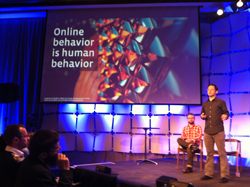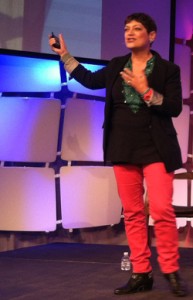A Shade for the Earth, Tablets in Ethiopia, and More from EmTech 2012
-
-
slice.mit.edu
- 1
Filed Under
Recommended
Held at the Media Lab, the conference had a heavy Institute influence, with presentations from close to a dozen alumni, faculty, and affiliated researchers.
David Keith PhD '91, professor of applied physics and professor of public policy at Harvard University, argued for adding one million tons of sulfuric acid to Earth’s upper atmosphere, which could shade the planet from increased global warming. Keith believes geoengineering—interventions in Earth’s climate to prevent rising temperatures—will a feasible option within the next 50 years, but political problems will arise. [Watch “Reigniting Innovation.”]
"Once you invent a new technology, you have no idea where it will go… (Geoengineering) could lead to two nuclear-armed states fighting over the thermostat."

Facebook data scientist Andrew Fiore SM '04 discussed social media's reshaping of society, Facebook’s always-evolving news feed, and what influences Facebook users. Fiore says, in today’s society, there is minimal difference between online and offline behavior. [Watch "The Personal Implications of Big Data."]
"Online behavior is quickly becoming the behavior of humanity…Strong relationships are individually more influential, but weaker ones are collectively more influential."Idit Harel Caperton PhD '88, president of the World Wide Workshop, and Nicholas Negroponte '66, MArch '66, founder of One Laptop Per Child, discussed technological approaches to teaching and learning. [Watch "Education and Learning."]
Negroponte described a field experiment that delivered one solar-powered tablet—filled with games, books, cartoons, and movies—to each child in two remote Ethiopian villages, without instruction. Within five minutes, the tablets were unboxed. After the first week, each child averaged 47 apps per day. After week two, the children were singing the alphabet.
"The big question is: will they learn to read? If they can, it can impact the 100 million kids who don't go school, and impact the kids who go to school but don't learn to read."

Capterton advocated for Media Lab-like thinking in public schools, including learning-by-design, and using gaming to alter student attitudes towards school.
"Every child in this country should learn English, Spanish, Chinese—and coding…When the only constant is change, we all need to become expert learners."The conference also honored this year’s TR35—Technology Review's selection of the top 35 innovators under age 35. This year's list includes Ken Endo PhD '12, Abraham Flaxman '00, Drew Houston '05, Shishir Mehrotra '00, and Baile Zhang PhD '09, plus six MIT-related faculty, post-docs, and researchers.
View more information and videos—which includes presentations from Media Lab Director Joi Ito, edX President Anant Agarwal, and Ken Morse '68—at EmTech 2012.








Comments
Tablets
Sat, 06/01/2013 4:01am
Good thing technology is used as a means to what really should be used that is the welfare of society and more these countries that need many resources in all aspects and that most of the time they can never reach.